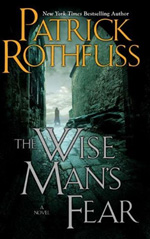
![]() Tar Daddoo
Tar Daddoo
8/25/2013
![]()
[The Wise Man's Fear continues the story started in The Name of the Wind. My review of the earlier book can be found here.]
What is the Fantasy premise?
The Wise Man's Fear continues the adventures of Kvothe through an additional year or so at the University and on to a year or so abroad as he travels out into the "four corners of civilization." As in The Name of the Wind, Kvothe encounters both "University" magic and deep magic.
Where does the Fantasy premise come from and what governs its use?
The University magic continues to be explainable, following rules and principles that we have learned about through Kvothe's studies at the University. Admittedly, Kvothe is becoming more capable and his uses of magic are becoming more dramatic, especially as he leaves the sheltered environment of the University. Nevertheless, the magic he uses still has the feel of being like a science.
The one possible exception to this is his ability to Name. While this is a University subject, it does not lend itself to easy explanation or rules. In this sense, it feels a little like the one piece of the deeper magic that is available to those who can master it.
Kvothe also encounters more of the deeper magic. This form of magic remains somewhat inexplicable even though we are told more about it.
Is the impact of the premise on an individual explored?
Kvothe continues to use magic to address his challenges with each success leading to deepened capabilities and a greater reputation. He is met with awe, suspicion, and fear. depending on who is being served or harmed by his abilities. Over the course of this story, Kvothe becomes a "grown-up" even though he is still only about eighteen or so.
Is the impact of the premise on society explored?
The author continues and deepens his portrayal of the fantasy world in which Kvothe lives, especially once Kvothe leaves the University. We encounter at least two new cultures and the lives of ordinary folk who are just trying to get by.
As for the role of magic, the University magic is taken for granted when it is used in familiar ways to improve people's lives and viewed with suspicion whenever it seems strange. The deep magic remains mostly inexplicable to everyone. It is approached with superstition by the ignorant and disbelief by the learned.
Kvothe's encounters with both kinds of magic are a bit more serious in this book than in the first. In addition, Kvothe learns that the deeper magic is known to others besides himself.
How well written is the story?
The book is long (1100 pages!), but well written. As with The Name of the Wind, I found it difficult to put the book down.
Once again, however, I found the book frustratingly incomplete. There is no single story arc that binds the book together. There is a sequence of smaller stories, but no challenge, problem, issue, or conflict that requires resolution before the end of the book. As with The Name of the Wind, we have deepened our understanding of Kvothe and the world he lives in, but we do not have the satisfaction of a completed story or even substantial progress on the main story that binds the trilogy together.
Can I recommend the book?
I find I have very ambivalent feelings about The Wise Man's Fear. I do not read so quickly that 1800 pages (the two books combined) is a minor reading investment for me. I definitely would have expected more progress on the major story arc and some book size stories to carry me forward through the trilogy. Instead, I am learning a lot of detail about one man's life and the fantasy world in which he lives through a sequence of small stories. Having said that, I should add that the details are interesting. the small stories are well told, and I really want to know what happens next.
I know I will read the third and, I hope, last book as soon as it becomes available, but I do not yet have evidence that the author can provide a payoff suitable to my large investment. With each new page I read, my expectation is that I will be ever more entranced and overwhelmed by the final resolution of the trilogy. I know the author can handle the small stories and keep me coming back, but can he really manage the big ending that i now feel I am owed?
Moreover, can he really wrap things up in just one more book? It has taken him 1800 pages to move through about six years of Kvothe's life. I believe we have almost 12 years left to go to reach the current time. Will the author require 3600 more pages? Do we need four more books? I certainly hope not.
If you are one who simply enjoys projecting yourself into a fantasy world, then The Wise Man's Fear will sustain you. For my part, I am becoming impatient to see the story move along towards its climax.